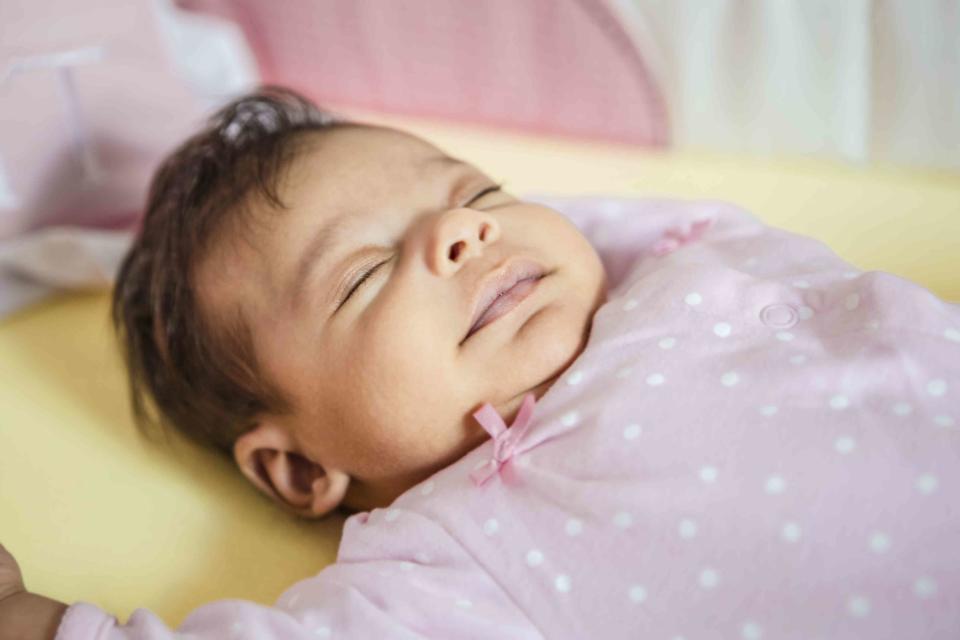Amazon and Target Stop Selling Weighted Baby Blankets, Sleep Sacks, and Swaddles—Here’s Why
Experts say these types of products are not safe for babies.

GettyImages/Andria Patino
Fact checked by Sarah Scott
Safe sleep for babies is critical and parents are often looking for products to help their little ones get the best zzz's. Now retailers including Amazon, Target, and Babylist, are making it easier for parents to avoid products that may be unsafe, with their latest decision to prohibit the sale of weighted baby blankets, sleep sacks, and swaddles.
The companies have decided to stop selling these products because of safety concerns, according to a new report from Consumer Reports.
These weighted products usually have small plastic beads sewn into them in an attempt to “provide a gentle, comforting pressure on babies’ bodies that helps them fall asleep and stay asleep longer,” Consumer Reports explains. “Some of the swaddles are marketed for use with newborns.”
But while babies can snooze in a sleep sack, swaddle, or wearable blanket, experts have been advising parents against using any that are weighted.
In 2022, the American Academy of Pediatrics (AAP) released its updated sleep recommendations for babies, sharing, “Weighted swaddles, weighted clothing, or weighted objects on or near the baby are not safe and not recommended.”
The following year, the AAP wrote to federal regulators about weighted products, stating, “The evidence available at this time does not indicate that weighted swaddle products are safe, nor does it demonstrate that they are effective in helping babies sleep longer or with fewer disruptions.”
The Consumer Product Safety Commission (CPSC) also urged parents not to use weighted sleep products and told Consumer Reports that it was aware of at least one infant death from weighted sleep products.
Consumer Reports shares that these products can obstruct a baby’s breathing and heart rate. They may also make it difficult for a baby to get out of an unsafe sleeping position, leading to a suffocation risk. Keep in mind, weighted blankets are not recommended for older children either.
“It’s promising to see companies including Amazon and Target step up and make the right decision, based on the recommendations of medical and safety experts,” Oriene Shin, policy counsel for Consumer Reports, shares in a statement.
Shin continues, “Too often, products that contradict clear expert guidance are for sale for years and end up putting babies and children at serious risk. Parents deserve nothing less than products that are proven safe before entering the marketplace. All retailers and online platforms should immediately stop selling these concerning products.”
Walmart and Buy Buy Baby also do not sell weighted baby sleep products, but parents can find them at other retailers, such as Dreamland Baby and Nested Bean.
U.S. Senator Richard Blumenthal (D-CT) previously shared concerns about the two companies selling these products saying that their claims are “dubious.” Further, Senator Blumenthal, wrote, “It is clear that there is not yet enough understanding of the impact of weighted sleep products on infants and they should not be marketed as ‘safe’ especially since medical professionals have expressed such serious concerns.”
Both Dreamland Baby and Nested Bean said they disagree with the retailers' decisions to stop selling weighted sleep sacks, and they stand by their products. However, parents should stick to advice from medical experts and focus on evidence-based safe sleep policies. Those include:
Placing a baby on their back to sleep
Using a crib, bassinet, or portable play yard that has a flat, firm mattress with a fitted sheet
Not placing loose blankets, pillows, stuffed animals, bumpers, or any other soft items in a baby’s sleep space
If you have any concerns or questions about the best sleep practices for your baby or older child, make sure to speak with their health care provider.
For more Parents news, make sure to sign up for our newsletter!
Read the original article on Parents.

